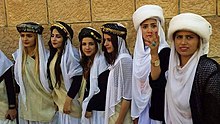Wayazidi

Wayazidi ni kabila la watu wanaoishi hasa katika eneo la Kurdistan[1][2][3] na kwa namna ya pekee katika sehemu yake nchini Iraq[4][5], lakini wengine wengi wamekimbilia Ujerumani[6][7] na nchi nyingine.
Wanakadiriwa kuwa milioni moja au moja unusu.
Wanafuata dini yao maalumu ambayo inamuabudu Mungu mmoja tu. Kwa ajili yake wamedhulumiwa sana na Waislamu waliotawala eneo lao, kwanza Waarabu, halafu Waturuki.
Tanbihi
- ↑ Nelida Fuccaro (1999). The Other Kurds: Yazidis in Colonial Iraq. London & New York: I. B. Tauris. uk. 9. ISBN 1860641709.
- ↑ Pirbari, Dimitri; Grigoriev, Stanislav. Holy Lalish, 2008 (Ezidian temple Lalish in Iraqi Kurdistan).
- ↑ Omarkhali, Khanna (2017). The Yezidi religious textual tradition, from oral to written : categories, transmission, scripturalisation, and canonisation of the Yezidi oral religious texts: with samples of oral and written religious texts and with audio and video samples on CD-ROM. ISBN 978-3-447-10856-0. OCLC 994778968.
- ↑ Kane, Sean (2011). "Iraq's disputed territories". PeaceWorks. United States Institute of Peace. Iliwekwa mnamo 15 October 2018. Check date values in:
|accessdate=(help) - ↑ "On Vulnerable Ground – Violence against Minority Communities in Nineveh Province's Disputed Territories". Human Rights Watch. November 2009. Iliwekwa mnamo 15 October 2018. Check date values in:
|date=, |accessdate=(help) - ↑ Alkaidy, Gohdar. "Mir Tahsin Said Beg: Oberhaupt der Jesiden stirbt im deutschen Exil", 28 January 2019.
- ↑ Meyer, Natalie Lydia. "Geschichten vom Leid der Verfolgung". Westfalen-Blatt (kwa de-DE). Iliwekwa mnamo 19 May 2019. Check date values in:
|accessdate=(help)
Marejeo
- Açıkyıldız, Birgül (2014). The Yezidis: The History of a Community, Culture and Religion. London: I.B. Tauris & Company. ISBN 978-1-784-53216-1. OCLC 888467694.
- Cumont, Franz (1911). The Oriental Religions in Roman Paganism. Chicago, IL: Open Court Publishing. ku. 152–153. ISBN 978-0-486-20321-8. OCLC 670375427.
- Drower, E.S. (1941). Peacock Angel; Being Some Account of Votaries of a Secret Cult and Their Sanctuaries. London: John Murray. OCLC 4821609.
- Husseini, Rana (2012). "Chapter 15. The Historical and Religious Seeds of 'Honor'". Katika Clark, Kelly James. Abraham's Children: Liberty and Tolerance in an Age of Religious Conflict. New Haven: Yale University Press. ISBN 978-0-300-18333-7. OCLC 809235956.
- Joseph, Isya (January 1909). "Yezidi Texts". The American Journal of Semitic Languages and Literatures 25 (2): 111–156. JSTOR 527914. doi:10.1086/369616. Unknown parameter
|doi-access=ignored (help); Check date values in:|date=(help) - Kreyenbroek, Philip G. (1995). "Yezidism -- Its Background, Observances, and Textual Tradition". Texts and Studies in Religion (kwa ku, en) (Lewiston, Queenston and Lampeter, NY: Edwin Mellen Press) 62. OCLC 31377794. ISBN 978-0-773-49004-8
- Kreyenbroek, Philip G.; Kartal, Z.; Omarkhali, Kh.; Rashow, Kh. Jindy (2009). Yezidism in Europe: Different Generations Speak About Their Religion. Wiesbaden: Harrassowitz Verlag. ISBN 978-3-447-06060-8. OCLC 554952854.
- Omarkhali, Kh. "Yezidism: Society, Symbol, Observance". Istanbul, 2007. In Kurdish.
- Reshid, Tosine (2005). "Yezidism: historical roots". International Journal of Kurdish Studies 19 (1–2). Iliwekwa mnamo 29 May 2022. Check date values in:
|accessdate=(help) - Rodziewicz, A., Yezidi Eros. Love as The Cosmogonic Factor and Distinctive Feature of The Yezidi Theology in The Light of Some Ancient Cosmogonies, Fritillaria Kurdica, 2014/3,41, pp. 42–105.
- Rodziewicz, A., Tawus Protogonos: Parallels between the Yezidi Theology and Some Ancient Greek Cosmogonies, Iran and the Caucasus, 2014/18,1, pp. 27–45.
- Williams, Kayla, and Michael E. Staub. 2005. Love My Rifle More Than You. W.W. Norton, New York. ISBN 0-393-06098-5
- Victoria Arakelova Yezdistan versus Kurdistan: Another Legend on the Origin of the Yezidis // Iran and the Caucasus 21 (2017)
Viungo vya nje
- Les Ezidis de France Archived 26 Machi 2020 at the Wayback Machine.
- Yazda – A Global Yazidi Organization
- The Beginning of the Universe Archived 22 Desemba 2007 at the Wayback Machine., photos and a description of Yezidi life in Lalish, Iraq, by Michael J. Totten (22 February 2006).
- Rubin, Alissa J.. "Persecuted Sect in Iraq Avoids Its Shrine", The New York Times, 14 October 2007.